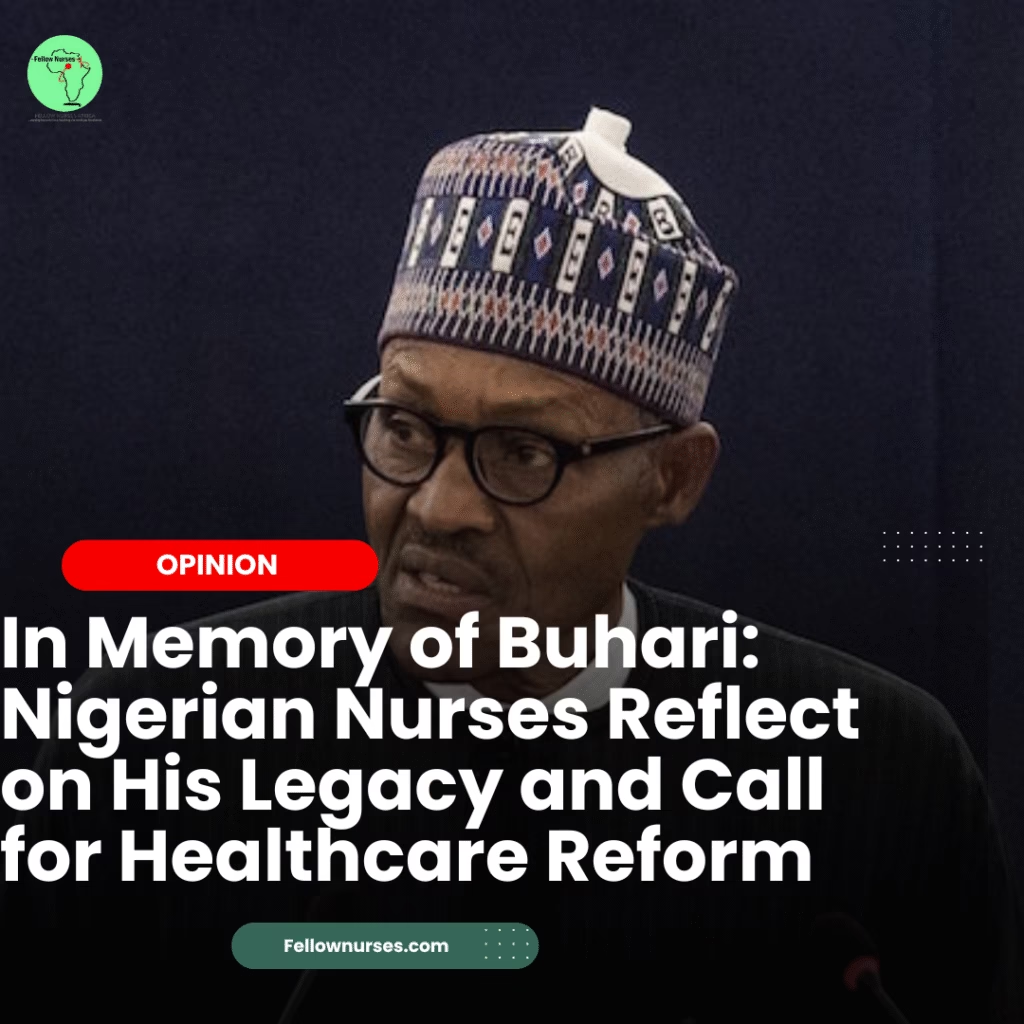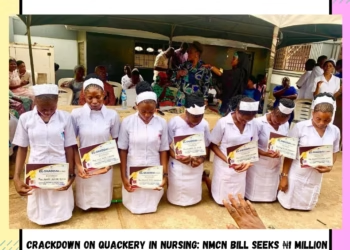Fellow Nurses Africa |Opinion | 14 July, 2025.
Introduction
On July 13, 2025, Nigeria lost former President Muhammadu Buhari, a leader whose tenure shaped our nation in profound ways. As we mourn his passing in a London hospital, we also reflect on the state of our healthcare system—a system where Nigerian nurses have been the unsung heroes, working tirelessly in underfunded wards to save lives.
For every nurse in Lagos, Kano, or Enugu, Buhari’s death abroad is a reminder of the challenges you’ve faced: poor staffing, broken equipment, long shifts, and the pain of seeing patients struggle for care you couldn’t fully provide. As we honor Buhari’s memory, let’s use this moment to call for a healthcare system that reflects the resilience and dedication of Nigeria’s nurses.

A Time to Mourn, A Time to Reflect
Our hearts go out to Buhari’s family, friends, and all Nigerians grieving his loss. His leadership, from his military rule (1983–1985) to his democratic presidency (2015–2023), was marked by efforts to address corruption and insecurity, even as challenges persisted. As nurses, we recognize the weight of leadership and the complexities he faced. Yet, his passing in a foreign hospital has sparked a national conversation—one that echoes in hospital corridors about why Nigeria’s healthcare system remains unable to serve all, from leaders to ordinary citizens.
The Healthcare Struggle Under Buhari’s Tenure
During Buhari’s presidency, Nigeria’s healthcare system faced significant hurdles. The World Health Organization reported in 2021 that health expenditure was just 3.4% of GDP, far below the global average of 10% (WHO Global Health Expenditure Database, 2021). Federal hospitals, where many nurses work, received only 4.7% of the national budget on average, according to BudgIT (BudgIT, 2022). Nurses like Chinyere, a midwife in Port Harcourt, recall the daily grind: “We delivered babies by torchlight during power outages. No incubators, no steady supplies. But we kept going because our patients needed us.” Her story, shared with Fellow Nurses Africa, mirrors countless others across Nigeria.
Buhari’s frequent medical trips to the UK—estimated at over 200 days abroad for health reasons—highlighted the gap between Nigeria’s healthcare reality and the care available elsewhere. Nigerians have expressed grief tinged with frustration, noting the irony of a leader seeking foreign care while local hospitals struggled. This isn’t just a policy issue—it’s personal. Every nurse who has comforted a patient’s family, worked a double shift, or bought supplies out of pocket feels the weight of a system stretched thin.
Nurses: The Heartbeat of Nigeria’s Healthcare
Despite these challenges, Nigerian nurses have shown extraordinary resilience. During Buhari’s tenure, nurses improvised solutions—like using kangaroo mother care to save newborns when incubators were unavailable—or led community health outreaches during economic recessions in 2016 and 2020. The National Association of Nigeria Nurses and Midwives (NANNM) fought for better conditions, staging strikes in 2018 and 2021 to demand fair wages and equipment. Yet, the brain drain persisted, with over 57,000 nurses leaving Nigeria between 2015 and 2022, driven by low salaries (averaging 150,000 Naira monthly for entry-level nurses) and poor working conditions.
Turning Grief into Action
As we mourn Muhammadu Buhari, we also see an opportunity to honor his memory by building a healthcare system he would have been proud to rely on. Nurses, you are not just caregivers—you are advocates, leaders, and the heartbeat of Nigeria’s health sector. Your stories of resilience can inspire change. Imagine a Nigeria where hospitals are equipped with modern tools, where nurses earn living wages, and where no one needs to travel abroad for care. This vision requires action: increased health budgets to meet WHO’s 10% GDP recommendation, investment in training, and policies to retain nurses.
Your Voice Can Shape Nigeria’s Future
In this moment of national mourning, let’s channel our grief into purpose. Share your stories from Buhari’s era—triumphs and struggles alike—on Fellow Nurses Africa’s platforms. Together, we can build a healthcare system that honors both our patients and our profession.
Conclusion: A Legacy Worth Building
Muhammadu Buhari’s passing is a moment to grieve, but also to reflect and act. Nigerian nurses, you’ve carried Nigeria’s healthcare system through its darkest days. Your resilience kept our nation’s heartbeat strong during Buhari’s presidency, and now, your leadership can shape its future. As we pay our respects to a leader gone, let’s commit to a Nigeria where every citizen—leader or laborer—can trust our hospitals. In memory of Buhari, let’s build a healthcare system that makes us all proud. The time is now, and nurses must lead the way.
Fellow Nurses Africa is the independent voice of African nursing, we educate, inform, and support the nursing profession.











Condolences to his family and well wishers. This is supposed to serve as a clarion call for the government to work on our healthcare system. I won’t be surprised if Nigerian Nurses and doctors were caring for him over there yet there aren’t good care facilities or renumerations for them to remain in Nigeria. It is well.